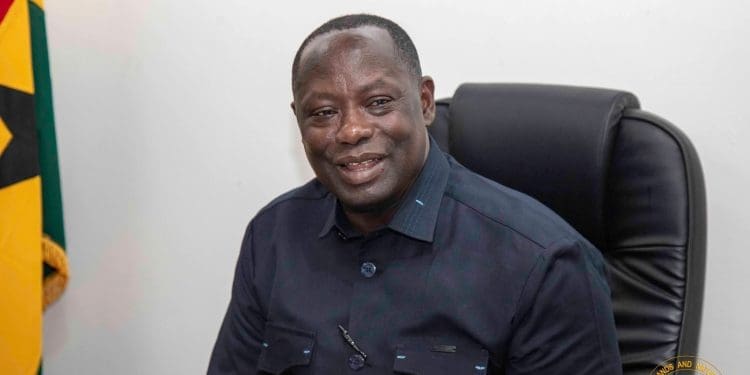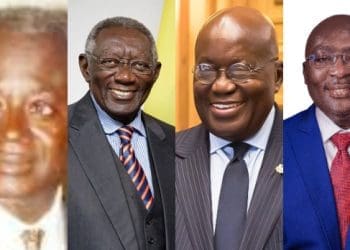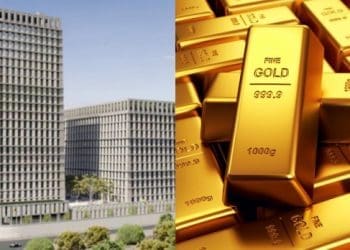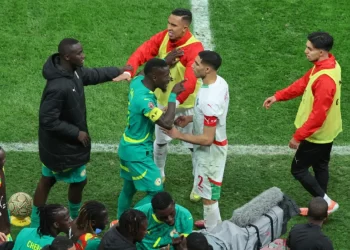Ghana’s historic opportunity to secure unprecedented value from its lithium resources is slipping through the new government’s fingers, following its controversial decision to slash the royalty rate for Barari DV Ghana Limited from the previously negotiated 10% to the legally prescribed 5%.
Investor had already agreed to 10%
The move has triggered widespread criticism, not only because it halves Ghana’s potential earnings from one of the world’s most strategic minerals, but because the company had already accepted the 10% rate negotiated by the previous administration.
Parliamentary review underway
The Parliamentary Committee on Lands and Natural Resources has now begun reviewing the renegotiated agreement laid before Parliament by the Minister of Lands and Natural Resources, Emmanuel Armah-Kofi Buah.
At a press conference in Accra, the Committee Chairman, Alhaji Collins Dauda, announced that stakeholders were being invited to scrutinise the new deal, insisting that Parliament would not rush to ratify anything without extensive consultation.
Legal justification sparks debate
He explained that the current Minerals and Mining (Amendment) Act, 2010 (Act 794), fixes mining royalties at 5 per cent, and the government was therefore bound to apply the law.
According to him, any attempt to charge the earlier announced 10% royalty must be backed by an amendment to the legislation.
However, this explanation has raised more questions than answers.
Historic breakthrough undermined
Under the previous government, Ghana celebrated what many described as a historic breakthrough: the negotiation of a 10% royalty for lithium, the highest ever agreed for any mineral in the country’s history and one of the most competitive anywhere in the world.
Barari DV Ghana Limited, a subsidiary of Atlantic Lithium Limited, had accepted that rate in the earlier discussions. It was the first time Ghana had succeeded in pushing a multinational mining investor to accept royalty terms that truly reflected the value of the resource being extracted.
Public suspicion grows
So why did the current government walk away from such a significant gain?
Why renegotiate downwards when the investor had already expressed readiness to pay the higher amount? And why did the government not prioritise amending Act 794 to protect Ghana’s interest before returning to Parliament with a deal worth far less than what had already been secured?
This lack of clarity has heightened public suspicion, especially because the Ewoyaa lithium project in the Mfantseman Municipality is forecast to be one of the most lucrative mining operations in West Africa.
Lithium: Strategic resource, untapped potential
Lithium is the cornerstone of global clean energy transition, and prices, although currently lower than their peak, remain volatile and expected to recover.
Giving up 5% of royalties at the very beginning of a 15-year lease, covering more than 42 square kilometres of some of Ghana’s most valuable mineral deposits, appears to many observers as an unnecessary concession that weakens the country’s negotiating position for decades.
Temporary price swings do not justify cuts
The Minister has justified the renegotiation based on the claim that global lithium prices have dropped sharply from $3,000 per tonne to about $630.
But critics argue that mining agreements are not designed around temporary price swings, especially in markets known for rapid rebounds.
Other gains at risk
Moreover, Ghana had already secured other favourable terms in the previous arrangement, including a 19% state equity participation with a mandatory requirement to increase Ghanaian ownership to at least 30% through the Ghana Stock Exchange.
These gains were celebrated as the beginning of a new era in mineral governance, one that prioritised national benefit over investor pressure.
Political will, not law, in question
The government’s decision to step back from the 10% royalty, therefore, appears less like a legal compulsion and more like a failure of political will.
Alhaji Collins Dauda himself acknowledged that the Minister of Lands and Natural Resources has the authority to propose and increase mineral royalties, subject to parliamentary approval.
If Parliament preferred a higher rate, and if the investor had already accepted a higher rate, then what exactly prevented the government from maintaining the 10% royalty while simultaneously initiating the amendment to Act 794?
Economic loss cannot be ignored
This is the heart of the controversy. Ghana is set to earn far less from its lithium resources, not because the investor refused the earlier terms but because the government chose to renegotiate the country’s gains downward.
Over the full life of the mine, the difference between a 10% and a 5% royalty amounts to hundreds of millions of dollars that could have funded infrastructure, schools, health facilities, and local development in mining communities.
It is an economic loss that cannot be justified by appeals to procedural technicalities.
Public input called, questions remain
The Committee on Lands and Natural Resources has now advertised for public input, and the Chairman insists that all opinions will be thoroughly considered before the agreement is brought back to the House.
But no amount of consultation will erase the fundamental question confronting the government: why reduce a royalty rate that the investor had already agreed to, when doing so directly disadvantages the Ghanaian people?
Renegotiation viewed as costly retreat
Why retreat from the most ambitious mineral revenue reform in the country’s history?
And why must Ghana always be asked to accept less, even in the face of undeniable opportunity?
Until the government provides clear and credible answers, the renegotiated lithium agreement will be viewed not as a technical correction but as a costly retreat—one that undermines Ghana’s economic prospects at a time when minerals such as lithium are shaping the future of global industry.












